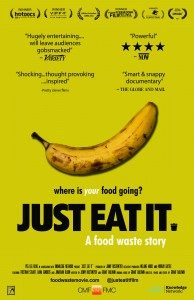Hello Food Firsters!
One of our past bloggers suggested that this may be a great idea for the blog! Here at Burnaby Food First, our passion is about ensuring that everyone has access to healthy and local foods.
A part of food security that does not get a lot of attention from our workshops, is food waste. How much of our food ends up in the trash. MetroVancouver has a Love Food, Hate Waste campaign which has some great resources on how to reduce waste as well as opportunities to share ideas or to discuss this very important topic.
This 74 minute movie follows Grant Baldwin and Jen Rustemeyer, in their efforts to live a zero-waste lifestyle, take on a new challenge: to eat only rescued food for six months.
The movie shows the Vancouver couple as they forgo restaurant meals and
quit grocery shopping cold turkey. What they find is shocking:
truckloads of perfectly edible food destined for the landfill.
Access the movie: https://www.knowledge.ca/program/just-eat-it or visit http://www.foodwastemovie.com/ for more information.
For Canadians, access to the movie is unlimited and free. Consider donating to help raise awareness of food security and support the movie.
4 Feb 2016 - Just posted online: French supermarkets banned from throwing away and spoiling unsold foods.
Showing posts with label Metro Vancouver. Show all posts
Showing posts with label Metro Vancouver. Show all posts
Saturday, February 6, 2016
Friday, October 31, 2014
Metro Vancouver 2015 Organics Ban: Are You Ready?
It's Hallowe'en again -- an evening of ghosts, monsters, haunted houses, and other things nipping in the night. (Or so we're told.) Lots of things are scary or gross, but you know what isn't? Compost, soil, and worms (okay, maybe those wrigglers)!
Did you know?
Starting January 1, 2015, the Metro Vancouver Regional District will be banning the disposal of food scraps and other organics in general garbage.
This includes raw food, table scrapings (raw and cooked), leftovers, depackaged food, meat, food scraps, and more! The collected organic waste will be composted by the district and used throughout municipalities for parks, city landscaping, and other greenery.
Many municipalities across the region already have food scraps programs
for single-family households. This region-wide program will expand the
organics ban to everyone in Metro Vancouver: from single-family households to apartments, commercial and industrial buildings, and institutions.
Why are we doing this?
Over a third of what we send to the landfill are compostable organics. By diverting these materials, we can reduce how much goes to the landfill as well as provide a source of rich composting materials.
When food and other organic materials end up in the garbage, they create methane (a powerful greenhouse gas) and fail to decompose because they are buried under layers of waste without access to oxygen. Composting these organics instead means we can save and return those valuable resources (water, energy, etc.) back to the land.
What should I do with my organic waste?
Regardless of where you live or work, composting (backyard or apartment/indoor) is an easy and great way to turn those food scraps nutrient-rich compost. If you don't have a garden for your finished compost, consider donating it to a local community or other gardening program!
During farmers' market season, you can also drop off your food scraps at many locations throughout Vancouver. Check here for a list.
For people in multi-family and other buildings, who do not receive food scraps service by municipal garbage pick-up, organics recycling will be operated by independent contractors through building management or other individual arrangements. If you live in an apartment, consider asking your landlord about including food scraps pick-up and starting a program for your building!
More Information
For more information on the 2015 Metro Vancouver Organics Ban, visit the program website here.
 |
| Source: Metro Vancouver Regional District |
Did you know?
Starting January 1, 2015, the Metro Vancouver Regional District will be banning the disposal of food scraps and other organics in general garbage.
This includes raw food, table scrapings (raw and cooked), leftovers, depackaged food, meat, food scraps, and more! The collected organic waste will be composted by the district and used throughout municipalities for parks, city landscaping, and other greenery.
Many municipalities across the region already have food scraps programs
for single-family households. This region-wide program will expand the
organics ban to everyone in Metro Vancouver: from single-family households to apartments, commercial and industrial buildings, and institutions.
Why are we doing this?
Over a third of what we send to the landfill are compostable organics. By diverting these materials, we can reduce how much goes to the landfill as well as provide a source of rich composting materials.
When food and other organic materials end up in the garbage, they create methane (a powerful greenhouse gas) and fail to decompose because they are buried under layers of waste without access to oxygen. Composting these organics instead means we can save and return those valuable resources (water, energy, etc.) back to the land.
What should I do with my organic waste?
Regardless of where you live or work, composting (backyard or apartment/indoor) is an easy and great way to turn those food scraps nutrient-rich compost. If you don't have a garden for your finished compost, consider donating it to a local community or other gardening program!
During farmers' market season, you can also drop off your food scraps at many locations throughout Vancouver. Check here for a list.
For people in multi-family and other buildings, who do not receive food scraps service by municipal garbage pick-up, organics recycling will be operated by independent contractors through building management or other individual arrangements. If you live in an apartment, consider asking your landlord about including food scraps pick-up and starting a program for your building!
More Information
For more information on the 2015 Metro Vancouver Organics Ban, visit the program website here.
Subscribe to:
Posts (Atom)
